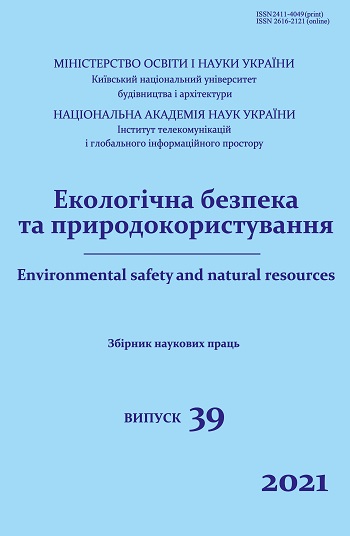Regulation of food waste management in Ukraine and abroad
DOI:
https://doi.org/10.32347/2411-4049.2021.3.51-68Keywords:
food loss, food waste, environmental legislation, implementationAbstract
In the world in general and in Ukraine in particular, there is a catastrophic environmental situation with food waste. The solution to the problem of waste accumulation, the organization of quality control of compliance with legislation in their treatment, the formation of environmental awareness of the population is hampered by the lack of unanimity in defining the essence of waste, industrial waste, waste in the regulatory framework and among scientists. The aim of the work is to study the essence of the definition of food waste in domestic and foreign scientific discussions and regulations in terms of improving the regulation of their treatment in Ukraine. Scientific discussion of domestic and foreign authors on the concept of waste, in particular food, as well as their regulations demonstrate a wide variety of not only definitions but also approaches. This takes into account the legal basis for waste operations, their physical condition and properties, environmental and economic characteristics, the criterion of goal setting, accounting approach and so on. The analysis of the existing classifications of waste stated the absence of a separate category of food waste both in the works of Ukrainian scientists and in domestic regulations, while foreign authors are actively researching this category. According to the results of the study, it is proposed to introduce into the domestic regulatory framework the term "loss of food and food waste" commonly used abroad with the following definition: products (substances) as edible parts of plants and animals produced or collected for human consumption but ultimately not consumed. Critical analysis of domestic environmental legislation in comparison with European allowed to propose the implementation of the Waste Framework Directive, as well as the formation of a hierarchy of waste management priorities: prevention, preparation for reuse, recycling, other types of disposal, elimination as Ukraine's European integration. Areas of further research will be the study of food waste disposal technologies of the modern city.
References
Korniakova, N.O. (2004). Poniattia vidkhodiv za zakonodavstvom Ukrainy ta Yevropeiskoho Soiuzu: porivnialno-pravovyi analiz. Pravo Ukrainy, 5, 149-153 [in Ukrainian].
Trusov, A.D., & Zakharov, A.N. (1986). Kompleksnoye ispolzovaniye syryevykh resursov: puti povysheniya ekonomicheskoy effektivnosti v usloviyakh NTP. Moscow: Ekonomika [in Russian].
Derykolenko, O.M., & Kerzhakov, V.I. (1986). Ekonomika vykorystannia vtorynnykh materialnykh resursiv. Kyiv [in Ukrainian].
Pylypiv, N.I., & Maksymiv, Yu.V. (2010). Ekonomichna sutnist ta klasyfikatsiia vidkhodiv dlia vidobrazhennia yikh v obliku na derevoobrobnykh pidpryiemstvakh. Visnyk ZhDTU, 3 (53), 201-205 [in Ukrainian].
Pro vidkhody: Zakon Ukrainy vid 05.03.1998. № 187/98 – VR. Retrieved from: https://zakon.rada.gov.ua/laws/show/187/98-%D0%B2%D1%80#Text [in Ukrainian].
Pro alternatyvni vydy ridkoho ta hazovoho palyva: Zakon Ukrainy vid 14.01.2000. № 187/98 – VR. Retrieved from: https://zakon.rada.gov.ua/laws/show/1391-14#Text [in Ukrainian].
Klasyfikator vidkhodiv DK 005-96: nakaz Derzhstandartu Ukrainy vid 29.02.1996. № 89. Retrieved from: https://zakon.rada.gov.ua/rada/show/v0089217-96#Text [in Ukrainian].
DSTU 2195-99 «Okhorona pryrody. Povodzhennia z vidkhodamy. Tekhnichnyi pasport vidkhodu»: nakaz Derzhstandartu Ukrainy vid 08.09.1999. № 167. Retrieved from: http://online.budstandart.com/ua/catalog/doc-page?id_doc=51481 [in Ukrainian].
Metodyka obstezhennia y pasportyzatsii hidrotekhnichnykh sporud system hidravlichnoho vyluchennia ta skladuvannia promyslovykh vidkhodiv: Nakaz Derzhkommistobuduvannia vid 19.12.1995 № 252. Retrieved from: https://zakon.rada.gov.ua/laws/show/z0466-95#Text [in Ukrainian].
Pikiner, V.V. (n.d.). Poniattia “vidkhody”: pravovyi, ekonomichnyi ta oblikovyi pidkhody. Retrieved from: http://eztuir.ztu.edu.ua/bitstream/handle/123456789/3014/45.pdf?sequence=1&isAllowed=y [in Ukrainian].
Pendak, V., & Paslavska, O.Ia. (n.d.). Pobutovi vidkhody – zahroza ekolohichnoi bezpeky liudstva. Retrieved from: http://dspace.wunu.edu.ua/bitstream/316497/19836/1/73-76.pdf [in Ukrainian].
Dovha, T.M. (2011). Klasyfikatsiia pobutovykh vidkhodiv yak peredumova efektyvnosti yikh retsyklinhu v Ukraini. Ekonomichnyi chasopys-KhKhI, 5-6, 50-53 [in Ukrainian].
Lipinski, B., Hanson, C., Lomax, J., Kitinoja, L., Waite, R., & Searchinger, T. (2013). Reducing food loss and waste. Working paper, installment 2 of «Creating a sustainable food future». Washington: World resources institute. Retrieved from: https://files.wri.org/s3fs-public/reducing_food_loss_and_waste.pdf.
Global food losses and food waste – extent, causes and prevention (2011). Rome: FAO. Retrieved from: http://www.fao.org/docrep/014/mb060e/mb060e00.pdf.
Global initiative on food loss and waste reduction (2015). Rome: FAO. Retrieved from: http://www.fao.org/3/a-i4068e.pdf.
Hanson, C., & Mitchell, P. (2017). The business case for reducing food loss and waste. A report on behalf of Champions 12.3. Retrieved from: http://www.wrap.org.uk/sites/files/wrap/Report_The%20Business%20Case%20for%20Reducing%20Food%20Loss%20and%20Waste.pdf.
Richards, T.J., Hamilton, S.F. (2018). Food waste in the sharing economy. Food Policy, 75, 109-123. https://doi.org/10.1016/j.foodpol.2018.01.008.
Mylona, K., Maragkoudakis, P., Miko, L., Bock, A.-K., Wollgast, J., Caldeira, S., & Ulberth, F. (2018). Future of food safety and nutrition – seeking win-wins, coping with trade-offs. Food Policy, 74, 143-146. https://doi.org/10.1016/j.foodpol.2017.12.002.
Zezza, A., Carletto, C., Fiedler, J. L., Gennari, P., & Jolliffe, D. (2017). Food counts. Measuring food consumption and expenditures in household consumption and expenditure surveys (HCES). Introduction to the special issue. Food Policy, 72, 1-6. https://doi.org/10.1016/j.foodpol.2017.08.007.
Kotykova, O., Babych, M., & Pohorielova, O. (2020). Vtraty prodovolstva ta kharchovi vidkhody v lantsiuzi stvorennia vartosti prodovolstva v Ukraini. Agricultural and Resource Economics: International Scientific E-Journal, 3, 191-220 [in Ukrainian].
Pro zabezpechennia sanitarnoho ta epidemichnoho blahopoluchchia naselennia: Zakon Ukrainy vid 24.02.1994. № 4004-XII. Retrieved from: https://zakon.rada.gov.ua/laws/show/4004-12#Text [in Ukrainian].
Pro okhoronu navkolyshnoho pryrodnoho seredovyshcha: Zakon Ukrainy vid 25.06.1991. № 1264-XII. Retrieved from: https://zakon.rada.gov.ua/laws/show/1264-12#Text [in Ukrainian].
Pro povodzhennia z radioaktyvnymy vidkhodamy: Zakon Ukrainy vid 30.06.1995. № 255/95-VR. Retrieved from: https://zakon.rada.gov.ua/laws/show/255/95-%D0%B2%D1%80#Text [in Ukrainian].
Pro metalobrukht: Zakon Ukrainy vid 05.05.1999. № 619-XIV. Retrieved from: https://zakon.rada.gov.ua/laws/show/619-14#Text [in Ukrainian].
Pro zhytlovo-komunalni posluhy: Zakon Ukrainy vid 09.11.2017. № 2189-VIII. Retrieved from: https://zakon.rada.gov.ua/laws/show/2189-19#Text [in Ukrainian].
Pro khimichni dzherela strumu: Zakon Ukrainy vid 23.02.2006. № 3503-IV. Retrieved from: https://zakon.rada.gov.ua/laws/show/3503-15#Text [in Ukrainian].
Pro veterynarnu medytsynu: Zakon Ukrainy vid 25.06.1992. № 2498-XII. Retrieved from: https://zakon.rada.gov.ua/laws/show/2498-12#Text [in Ukrainian].
Pro vyluchennia z obihu, pererobku, utylizatsiiu, znyshchennia abo podalshe vykorystannia neiakisnoi ta nebezpechnoi produktsii: Zakon Ukrainy vid 14.01.2000. № 1393-XIV. Retrieved from: https://zakon.rada.gov.ua/laws/show/1393-14#Text [in Ukrainian].
Kodeks Ukrainy pro nadra vid 27.07.1994. № 132/94-VR Retrieved from: https://zakon.rada.gov.ua/laws/show/132/94-%D0%B2%D1%80#Text [in Ukrainian].
Dyrektyva № 2008/98/ЕS pro vidkhody (Ramkova dyrektyva pro vidkhody). Retrieved from: http://epl.org.ua/wp-content/uploads/2019/09/Ramkova-dyrektyva-presreliz.pdf [in Ukrainian].
Downloads
Published
How to Cite
Issue
Section
License
Copyright (c) 2021 Victoria M. Mikheenko, Ivan G. Hevlych, Taras I. Hevlych

This work is licensed under a Creative Commons Attribution 4.0 International License.
The journal «Environmental safety and natural resources» works under Creative Commons Attribution 4.0 International (CC BY 4.0).
The licensing policy is compatible with the overwhelming majority of open access and archiving policies.

